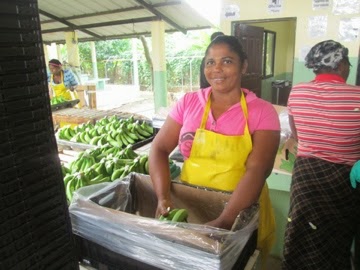F2F Country Highlight: Dominican Republic
Since June 2014, we have had 21 Farmer-to-Farmer
volunteers travel to the Dominican Republic under the new strategy to "increase
the resilience of vulnerable populations to the unpredictable impacts of global
climate change". This strategy is the first of its kind in the worldwide
Farmer-to-Farmer program, as its primary focus is on climate change rather than
a specific agricultural value chain. As a result, it has been a great
opportunity to engage new volunteers who bring diverse expertise outside of
agriculture. Over the past year, our volunteers' work has focused on
agroforestry, irrigation technology, water and soil quality and conservation,
plastic and solid waste management, environmental education, and disaster risk
mitigation. Below are some highlights of their work.
Soil Conservation
 |
| Hillside in Jarabacoa, Dominican Republic |
"The
area around Jarabacoa has suffered from extensive deforestation on
very steep land that has been converted to cropland and pastureland. Soil
erosion is extensive and widespread, adding high volumes of sediments and
fertilizers to surface waters. To combat this erosion, most farmer’s plant
their land on the contour using ridges and furrows to slow erosion and to help
prevent loss of crops. However, additional practices are needed to filter out
sediments from entering streams. The adoption of simple, cost effective Best
Management Practices (BMP’s) can help the farmer economically and significantly
reduce farm sediments, fertilizers and herbicides from entering streams and
rivers. Collaboration between Farmer-to-Farmer sponsors and staff, Extension
Service, Plan Yaque and the Ministry of the Environment and Agriculture is also
needed to educate and invigorate the farm community to install the needed
practices." - Jeff Knowles, Soil conservation
volunteer; retired 30 year veteran of the USDA’s Soil Conservation Service/Natural
Resources Conservation Service
 |
| Jeff Knowles meets with environmental NGO, Plan Yaque |
 |
| Jeff Knowles inspects ground cover for tajota fields |
Plastic Management and Soil Recovery on Banana Farms
 |
| Bananas ripen wrapped in plastic to protect from pests |
"The opportunity to
volunteer with Farmer-to-Farmer demonstrated that agricultural plastics
recycling is a global concern and that farmers that I work with in a rural
county in Wisconsin have the same concerns as those in the Dominican Republic,
producing food for the world in environmentally conscience ways." - Melissa
Kono, plastic management volunteer; current faculty at University of
Wisconsin-Extension
 |
| Ilan Bar assist trains farmers how to use soil and water test kits |
"As always, I believe that
the real and lasting impact of our work can be achieved if there is continuity
to what we are doing. I hope this project will continue, and from my
technical perspective, I think that the next most important thing is to get
more growers switching to good sprinkler systems and training in applying and
maintaining these systems." - Ilan Bar, soil recovery volunteer; agronomist and irrigation consultant
Agroforestry
 |
| Agroforestry volunteers Dave Lombardo, Bill Ryburn, and Glen Juergens |
"Water
quantity and quality is a major concern for rural agricultural
families. Protecting the water supply is a necessity to provide sufficient
water for human consumption. Agroforestry and crop rotation methods with
organic fertilizers and pesticides can improve crop yield and diversify
agricultural products while utilizing a single parcel of their land on a
permanent basis to grow their crops. A greater variety of tree species that are growing in an area
will ensure a more healthy forest, reduce potential damage from insects and
diseases, and reduce the amount of pesticides needed to control pests which are
common in monoculture agriculture. A diverse forest is a healthier
forest, not just for the trees growing there but also for wildlife."
- Dave Lombardo, Bill Ryburn, and Glen Juergens, agroforestry volunteers; silviculture, natural resource, and forestry consultants
Disaster Risk Mitigation
 |
| Flooding town in Montecristi, Dominican Republic |
"Tropical
storms and hurricanes occur often in the Dominican Republic and disrupt banana
plantation operations, especially when high and medium winds are paired with
flooding. The
resulting flash floods, destruction of banana plantations and property,
sedimentation and endarement of life should be addressed using a mixture of
mitigation and prevention measures." - Armando Milou, disaster risk
mitigation volunteer and GIS and water and sanitation consultant


To learn more about volunteering for our Farmer-to-Farmer program in the Dominican Republic, please contact Senior Program Officer, Courtney Dunham at cdunham@partners.net or visit our website here to see open volunteer opportunities in our other countries.


.png)

Comments
Post a Comment